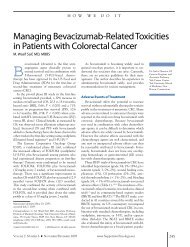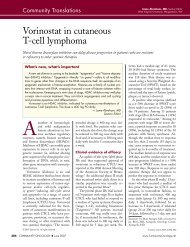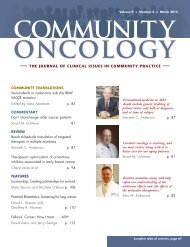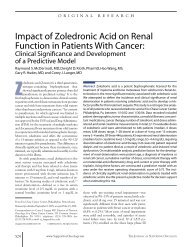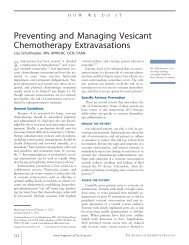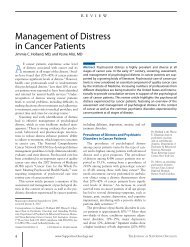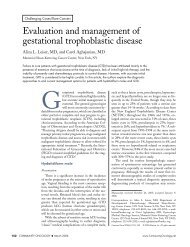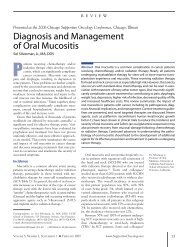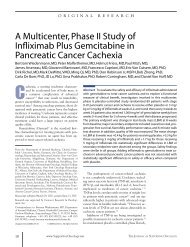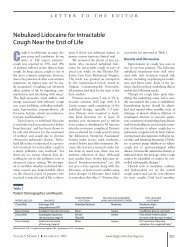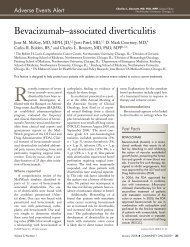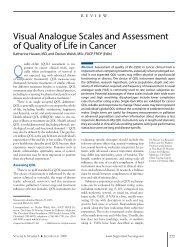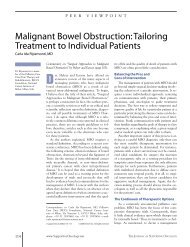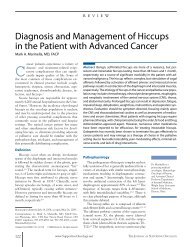Evaluating the “Good Death” Concept from Iranian Bereaved Family
Evaluating the “Good Death” Concept from Iranian Bereaved Family
Evaluating the “Good Death” Concept from Iranian Bereaved Family
You also want an ePaper? Increase the reach of your titles
YUMPU automatically turns print PDFs into web optimized ePapers that Google loves.
Personality Disorders in <strong>the</strong> Oncology Setting<br />
Table 2<br />
Personality Disorders and Management Strategies<br />
PERSONALITY DISORDER CHARACTERISTICS COMMON BEHAVIORS<br />
Paranoid Suspicious<br />
Misinterprets o<strong>the</strong>rs’ actions as<br />
malevolent<br />
Antisocial Charming and ingratiating<br />
Manipulative<br />
Has history of prior incarceration and<br />
probation<br />
Histrionic Flirtatious or sexually provocative<br />
Intensely emotional (which hinders<br />
rational discussion of treatment options)<br />
Dependent Intensely needy, anxious, seeks constant<br />
reassurance<br />
Narcissistic Entitled<br />
Exquisitely sensitive to losses in physical<br />
vitality and cognitive function<br />
experienced as a result of cancer <strong>the</strong>rapy<br />
Behaves well in medical settings when<br />
needs are being met<br />
Borderline Emotionally labile<br />
Fears abandonment<br />
Frequently changes residences, jobs and/<br />
or relationships<br />
Obsessive-compulsive High need for control, orderliness, and<br />
perfectionism<br />
Focuses on details as opposed to <strong>the</strong><br />
larger medical picture<br />
Depressive (not yet a DSM<br />
diagnosis, but under<br />
consideration for <strong>the</strong> next<br />
edition of DSM)<br />
Resists medications or chemo<strong>the</strong>rapy<br />
Mistrusts clinician<br />
Threatens legal action<br />
Tells compelling stories about life difficulties<br />
that induce <strong>the</strong> clinician to offer extra help or<br />
favors; stories later turn out to be lies<br />
Brings weapons to <strong>the</strong> clinic<br />
Provides vivid or exaggerated descriptions of<br />
physical symptoms<br />
Has difficulty tolerating delay or ambiguity<br />
Amplifies somatic complaints, prompting<br />
workups<br />
Calls and pages frequently between<br />
appointments<br />
Has difficulty making independent decisions<br />
Has trouble leaving office<br />
Fails to ask appropriate questions<br />
Feels a need for intensive care and support,<br />
including hospitalization, to get through cancer<br />
treatment<br />
Requests special consideration<br />
Directs even minor concerns to <strong>the</strong> oncologist<br />
ra<strong>the</strong>r than ancillary staff<br />
Talks at length to extend appointment times<br />
Becomes extremely distressed by hair loss,<br />
sexual function difficulties, “chemobrain,” and<br />
loss of function<br />
Displays impulsive behaviors such as self-injury,<br />
substance abuse, binge eating, or sexual<br />
promiscuity<br />
Nonadherent with medications<br />
Misses appointments<br />
Develops new symptoms during transition<br />
points in treatment (active treatment to<br />
survivorship; active treatment to palliative care)<br />
because of feelings of abandonment<br />
Repeatedly questions clinicians regarding small<br />
details of care<br />
Keeps meticulous logs of symptoms and<br />
medications<br />
Has difficulty tolerating <strong>the</strong> imperfections of <strong>the</strong><br />
process of receiving medical care<br />
Interprets events negatively Anticipates <strong>the</strong> worst: predicts negative<br />
outcomes of treatment even in <strong>the</strong> face of<br />
evidence to contrary<br />
POSSIBLE<br />
COUNTERTRANSFERENCE<br />
RESPONSES PROVOKED IN<br />
CLINICIAN<br />
Impatience, anger, fear<br />
Sympathy followed by<br />
anger and fear<br />
Arousal<br />
Fatigue<br />
Fatigue, guilt, aversion<br />
Anger; wish to<br />
counterattack<br />
Depression, self-doubt,<br />
anger<br />
Irritation, anger<br />
Depression,<br />
<strong>the</strong>rapeutic nihilism<br />
48 www.SupportiveOncology.net THE JOURNAL OF SUPPORTIVE ONCOLOGY



